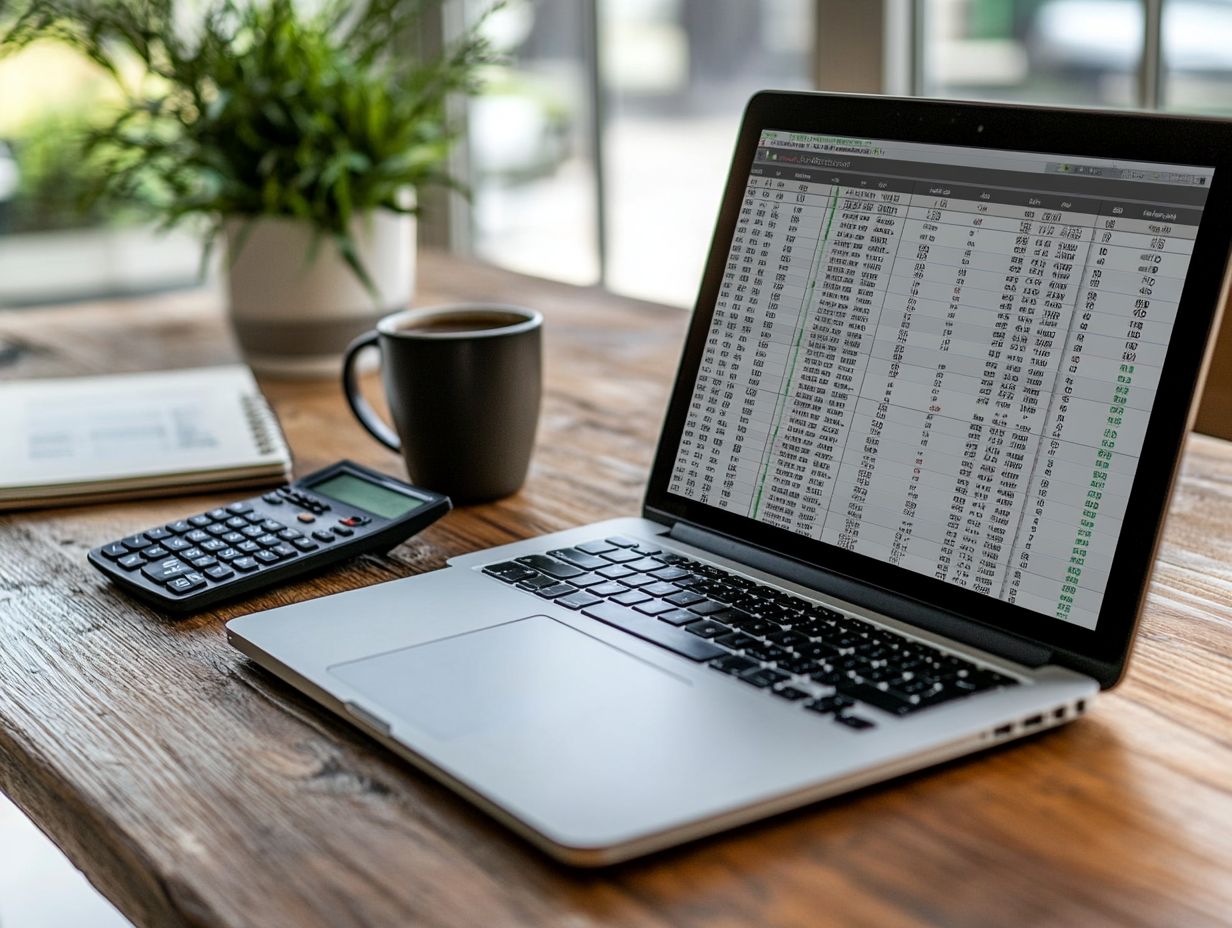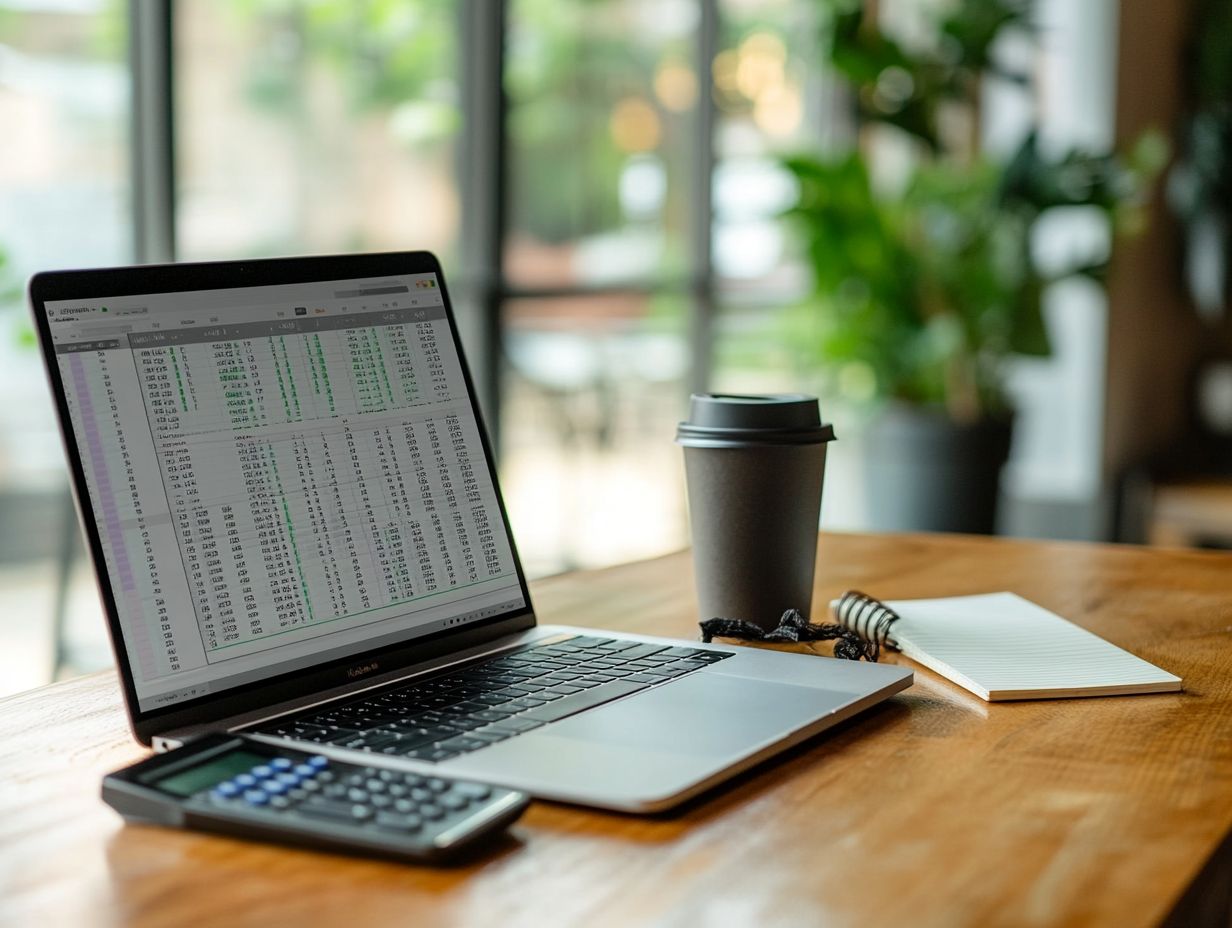What is the Best Way to Track Freelance Income and Expenses?
Contents
- Key Takeaways:
- Mastering Your Finances as a Freelancer
- Why Tracking is Important
- Methods for Tracking Freelance Income and Expenses
- Recommended Tools for Tracking
- Tips for Accurate Tracking
- Tax Implications of Freelance Income and Expenses
- Common Mistakes to Avoid
- Frequently Asked Questions
- What is the Best Way to Track Freelance Income and Expenses?
- Why is it important to track freelance income and expenses?
- Can I use a spreadsheet to track my freelance income and expenses?
- What should I include in my freelance income and expenses tracking?
- How often should I track my freelance income and expenses?
- Is it necessary to hire a professional to track my freelance income and expenses?
Key Takeaways:
- Keep track of your freelance income and expenses to understand your financial health and make informed business decisions.
- Use software or apps for more accurate and efficient tracking, but remember to maintain organized manual records.
- Understand tax results and deductions for freelance income and expenses to avoid common mistakes and ensure accurate reporting.
Mastering Your Finances as a Freelancer
Effectively managing freelance income and expenses is essential for a freelancer’s financial health. This process involves efficient cash flow management—the practice of tracking money coming in and going out—and using tools like Google Sheets for monitoring invoices and expenses.
Freelancers face unique challenges with client payment handling, budgeting, and tracking tax deductions. Establishing an organized system for managing these aspects is crucial for smooth operations and overall financial well-being.
Why Tracking is Important
Monitoring freelance income and expenses is vital for maintaining financial health and ensuring compliance with tax laws. This directly impacts cash flow management and business profitability.
Effective tracking methods help freelancers find recurring costs and uncover tax-saving opportunities, enhancing their cash flow management.
Benefits of Tracking Freelance Income and Expenses
Tracking income and expenses is essential for freelancers to achieve improved financial stability, effective income management, and maximize tax deductions. By diligently monitoring their business expenses and client payments, freelancers enhance their overall financial health.
Using a consistent accounting method for tracking income and expenses improves cash flow management. This structured approach makes it easier to locate and analyze financial records.
Employing accounting software helps freelancers sort expenses into areas like equipment, marketing, and travel, identifying potential cost-cutting opportunities. Organized records of income and expenses can lead to significant tax savings during tax season, reducing stress and minimizing the risk of filing errors.
Organizing finances helps freelancers make informed decisions about their future. Tracking income and expenses allows them to accurately project future earnings and pinpoint areas for investment to maximize revenue and profits.
Methods for Tracking Freelance Income and Expenses
Freelancers can monitor their income and expenses using either manual tracking or specialized software that automates bookkeeping.
Each method has its own advantages and disadvantages, allowing freelancers to choose the approach that best suits their needs.
Manual Tracking vs. Using Software
Freelancers must choose between manually tracking their income and expenses or using specialized software designed for bookkeeping. Each option has its pros and cons.
Manual tracking methods, such as using spreadsheets or pen and paper, offer a better grasp of financial details and complete control over data entry. However, these methods can be time-consuming and prone to human error, making it harder to generate nuanced reports quickly.
On the other hand, software solutions like Xero, Wave, and Expensify streamline processes by automating expense reporting and managing essential financial records. Xero provides easy access to real-time insights and analytics regarding cash flow, while Wave offers basic invoicing and expense-tracking free of charge. Expensify simplifies capturing expense and receipt information, making it a convenient choice for freelancers.
Don’t wait until tax season to get your records in order! Start tracking your finances today to ensure better results.
Recommended Tools for Tracking
The appropriate tools for tracking freelance income and expenses significantly enhance a freelancer’s organizational system. You can choose from a variety of tools. This includes accounting software and other resources for tracking income and expenses effectively.
Top Software and Apps for Freelance Income and Expense Tracking
The best software and apps for tracking freelance income and expenses include QuickBooks, FreshBooks, Xero, Wave, and Expensify. Each of these tools offers unique features that help freelancers stay organized and manage their cash flow in various ways. From invoice management to expense reports and digital receipts, these tools assist with income tracking, expense management, time tracking, and mileage reporting. They also automate the creation of invoices and payment reminders.
Here’s a brief overview of each:
- QuickBooks: A robust tool that offers powerful reporting features and seamless integration with PayPal, making it ideal for freelancers concerned about cash flow.
- FreshBooks: Known for its user-friendly interface, FreshBooks is perfect for freelancers seeking a straightforward, easy-to-use option. It provides mobile access and includes time-tracking features.
- Xero: Best suited for users who require a complete budgeting app, Xero offers a range of financial management features.
- Wave: A free option that provides the essential tools most freelancers need for managing their finances.
- Expensify: This app is particularly useful for freelancers in the transportation industry, as it allows for mileage tracking. Expensify also automates expense reporting, simplifying a process that can be time-consuming.
Tips for Accurate Tracking
Implementing best practices for accurately tracking freelance income and expenses is essential for maintaining transparent financial records and effective cash flow management. By systematically organizing expenses and meticulously recording income, freelancers can minimize the risk of errors during tax season and enhance their overall financial health.
Best Practices for Organizing and Recording Income and Expenses
To improve their financial health and streamline bookkeeping practices, freelancers should adopt best practices for organizing and recording income and expenses. This includes proper expense categorization and maintaining a year-to-date income statement.
Expense categories allow freelancers to quickly identify if they are overspending in certain areas. This helps them adjust their spending habits. Storing digital receipts not only clears your space but also makes bookkeeping a breeze!
Accurately recording income ensures that all earnings are tracked. This can lead to higher tax deductions when claiming eligible expenses. Overall, organizing and documenting income and expenses creates a clearer financial picture, resulting in easier record-keeping and improved tax outcomes.
Tax Implications of Freelance Income and Expenses
Freelancers need to know the tax implications of their income and expenses to comply with tax laws and maximize potential deductions. As they navigate these regulations, effective bookkeeping and recordkeeping of their financial transactions become essential during tax season.
Understanding Tax Deductions and Reporting
Understanding tax deductions and how to report freelance income is crucial for freelancers. This can enhance their financial health and ensure compliance with tax laws. By properly tracking business costs and income, freelancers can lower their taxable income and maintain tax compliance at year-end.
A wide range of expenses may qualify as deductions, including home office costs, equipment purchases, and travel expenses related to client meetings. Actively monitoring these expenditures can significantly reduce the overall tax burden.
For this reason, freelancers should keep detailed records of receipts and invoices to create a clear financial overview. Other best practices include categorizing income streams and expenses, which simplifies profit calculation at the end of the year. Investing in accounting software can help by providing intuitive reports that facilitate tax preparation.
Start implementing these strategies today for a smoother tax season!
Common Mistakes to Avoid
Tracking freelance income and expenses poorly can hurt your business and finances. Mistakes often come from weak systems or disorganized bookkeeping, leading to bigger problems later.
Pitfalls to Watch Out For When Tracking Freelance Income and Expenses
Common mistakes freelancers make include failing to back up records, organize digital receipts, and categorize income and expenses accurately. These pitfalls can lead to lost data and misleading financial reports.
- Failing to back up records: Without regular backups, data can be lost permanently, complicating record keeping.
- Failing to organize or store digital receipts: A lack of organization can complicate tax preparation and lead to incorrect reporting of income or expenses, impacting potential deductions.
- Failing to categorize income and expenses accurately: Inaccurate categorization can result in misleading financial reports and forecasts, hindering effective expense tracking.
Freelancers can enhance their tracking processes by using online software that helps manage finances from anywhere, such as QuickBooks, FreshBooks, or Xero. Establishing a regular routine for logging receipts and client payments, and implementing a categorization system can greatly enhance visibility into expense categories.
Frequently Asked Questions
What is the Best Way to Track Freelance Income and Expenses?
The best way to track freelance income and expenses is to use bookkeeping or accounting software such as QuickBooks, FreshBooks, Wave, or Expensify. These platforms allow you to track your income and expenses in one central location and produce detailed reports for tax purposes.
Why is it important to track freelance income and expenses?
Tracking your freelance income and expenses is crucial for staying organized and managing your earnings and expenses for tax purposes. It also helps you analyze your business finances, including recurring expenses, and make informed decisions about pricing and spending.
Can I use a spreadsheet to track my freelance income and expenses?
While a spreadsheet like Google Sheets can be a basic tool for tracking your freelance income and expenses, it may not be the most efficient method. Bookkeeping or accounting software is designed specifically for this purpose and can save you time while reducing errors.
What should I include in my freelance income and expenses tracking?
When tracking your freelance income and expenses, include all sources of income, such as client payments and affiliate income. Also, track all business-related expenses like office supplies, equipment, and marketing costs for the most accurate financial records.
How often should I track my freelance income and expenses?
It is recommended to track your freelance income and expenses regularly, such as weekly or monthly, to ensure effective cash flow management and maintain financial stability. Frequent tracking simplifies the process come tax time.
Is it necessary to hire a professional to track my freelance income and expenses?
While it isn’t necessary to hire a professional, consulting with an accountant or bookkeeper can be beneficial. They can help ensure your income and expenses, including invoice tracking and expense reports, are recorded accurately and efficiently.










